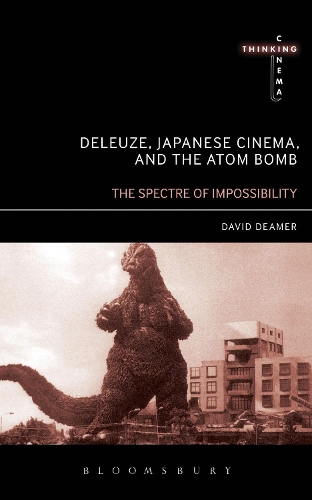
Deleuze, Japanese Cinema, and the Atom Bomb: The Spectre of Impossibility
(Hardback)
Available Formats
Publishing Details
Deleuze, Japanese Cinema, and the Atom Bomb: The Spectre of Impossibility
By (Author) David Deamer
Bloomsbury Publishing PLC
Bloomsbury Academic USA
25th September 2014
United States
Classifications
General
Non Fiction
Western philosophy from c 1800
791.430952
Physical Properties
Hardback
344
Width 152mm, Height 229mm
645g
Description
David Deamer establishes the first ever sustained encounter between Gilles Deleuze's Cinema books and post-war Japanese cinema, exploring how Japanese films responded to the atomic bombings of Hiroshima and Nagasaki. From the early days of occupation political censorship to the social and cultural freedoms of the 1960s and beyond, the book examines how images of the nuclear event appear in post-war Japanese cinema. Each chapter begins by focusing upon one or more of three key Deleuzian themes image, history and thought before going on to look at a selection of films from 1945 to the present day. These include movies by well-known directors Kurosawa Akira, Shindo Kaneto, Oshima Nagisa and Imamura Shohei; popular and cult classics Godzilla (1954), Akira (1988) and Tetsuo (1989); contemporary genre flicks Ring (1998), Dead or Alive (1999) and Casshern (2004); the avant-garde and rarely seen documentaries. The author provides a series of tables to clarify the conceptual components deployed within the text, establishing a unique addition to Deleuze and cinema studies.
Reviews
This ambitious book brings together three different constellations: the national cinema of Japan; the atom bombs thrown on Hiroshima and Nagasaki; and Deleuze. Surprising though this may sound, the book patiently and expertly weaves these three strands together to the point of making us feel that the Deleuzian cineosis was conceived to address precisely this kind of historico-cinematic encounter. Moving away from reductive ideas of genre, Deamer tackles the complexity of a wide and extremely varied body of films united by the catastrophe of the atom bomb, allowing for a re-evaluation of forgotten gems as well as celebrated masterpieces. Unveiling not one but many Japans, this book testifies to the enduring power and infinite uses of Deleuzes vision of cinema. -- Lcia Nagib, Professor of Film, University of Reading, UK
Deamers study is exemplary in its interweaving of film and philosophy. From a philosophical perspective, the book provides a clear, rigorous, and concrete reading of Deleuzes semiotics of cinema and its philosophical grounds. From a cinematic perspective, the book provides a fascinating, detailed study of Japanese cinema, demonstrating the continuing importance of the event of Hiroshima. It provides a thoroughly convincing case for the importance to Japanese cinema of the atom bomb, and the importance to the analysis of cinema more generally of Deleuzes philosophy of film. Highly recommended. -- Henry Somers-Hall, Senior Lecturer in Philosophy, Royal Holloway, University of London, UK
Deleuze, Japanese Cinema, and the Atom Bomb: The Spectre of Impossibility is a well written, clear, insightful and always to-the-point examination of the ways in which Japanese cinema has (and has not) dealt with the atomic bombs ... I congratulate Deamer for both the depth and the breadth with which he approaches this challenging topic ... Deamer writes fluidly, organises his thoughts clearly and displays a profound familiarity with the films that he has chosen as his examples. As a result, the book is a thoroughly pleasant, if demanding, reading experience. * Akira Kurosawa info *
Author Bio
David Deamer is Associate Lecturer in film at Manchester Metropolitan University, UK. He has published in Martin-Jones and Brown's Deleuze and Film; Bell and Colebrook's Deleuze and History; Deleuze Studies; and the online A/V Journal, of which he was co-founder. He blogs on Deleuze and cinema at www.daviddeamer.com.
